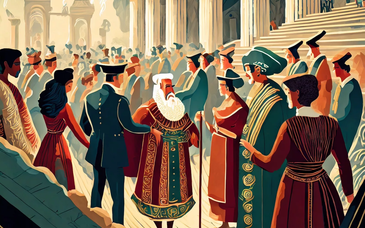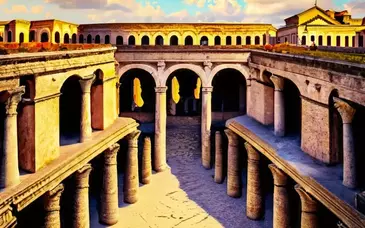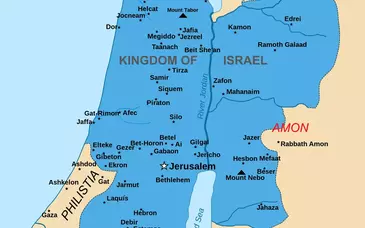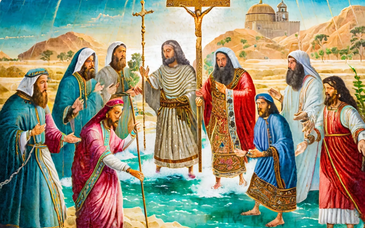1. Brief Account of Events Said to Have Occurred From 37 until 4 BCE,

Herod reigned in Jerusalem and gradually, with the approval of the Romans, expanded his kingdom; his kingdom included both Jews and Gentiles, but he did not follow the Hasmonean policy of forcibly converting gentiles to Judaism. Early in his reign, Antonius and Octavian had a falling out, which led to another civil war. In 31 BCE, Octavius, with the support of the Roman senate, fought and defeated Antonius at the battle of Actium in Greece; both Antonius and Cleopatra managed to escape and arrived in Alexandria; but, when they realized that there was no way of escaping Octavius, they committed suicide. Herod convinced the victorious Octavius to confirm him in his former position as King of the Jews. Herod had serious trouble with his family and his court in general; he was not greatly appreciated by the Jews generally, which bothered him. In a desire to aggrandize himself and perpetuate his memory, he undertook many expensive building projects in parts of his kingdom and beyond. In 19 BCE, Herod undertook to rebuild and enlarge the Temple in Jerusalem. (See Testament of Moses [6] for an unflattering description of Herod's reign presented as a prophecy.)
2. Primary Sources
2.1. Reading: Josephus, Antiquities 15-17.8.3 (199) (Translated by W. Whiston)
2.2. Reading: Josephus, War 1.18.1-33.9; 347-673 (Translated by W. Whiston)
- Herod's Palace at Jericho
- The Herodion
- Caesarea Maritima
- The Burnt House
- The Herodian Family
- Map of Herod's Kingdom


3. More Detailed Account of Events Alleged to Have Occurred with Citation of Sources
(*=significant apparent disagreement in sources)
| Date BCE | Events | Sources |
| 37 | Herod plunders the wealthy of Jerusalem in order to give gifts to Antonius and others; he kills forty-five of the leading members of the Antigonus' supporters. He rewards those who supported him during the siege, in particular the Pharisee Pollion and his disciple Samaias, who advised the people during the siege to open the gates to Herod. (This same Pollion was the one who spoke during Herod's trial, and foretold that, if Herod's life was spared, Herod would one day persecute Hyrcanus and the members of the Synhedrion.) Antonius executes Antigonus in Antioch by beheading him, in order to strengthen Herod's hold on the kingship. | Ant. 15.1.1-2; 1-10; War 1.18.1-4; 347-59; see Plutarch, Ant. 36 |
| 37/6 | Marcus Antonius gives Cleopatra control of Coele-Syria, the coastal region from the Eleutherus River to Egypt, Cilicia and Cyprus. Cleopatra also has designs on Herod's kingdom as well as that of the Nabataean king Malchus, and tries to convince Antonius to grant to her these territories. (Octavius and Antonius had agreed to share power, the former controlling the west and the latter the east; the other member of the second triumvirate, Lepidus, originally was given Africa to rule, but was deposed from power in 36 BCE and banished to Circeii.) | Ant. 15.3.8; 79; 4.1; 95; War 1.18.4-5; 360-62; see Plutarch, Ant. 36; Dio Cassius 49.32.4-5 |
| 36/5 | Hyrcanus II is released from his Parthian imprisonment and goes to reside in Babylonia, where there is a significant Jewish population. With Herod's encouragement, he leaves Babylonia and returns to Jerusalem, where Herod is at least outwardly respectful to him. Herod appoints as High Priest a certain Hananel as High Priest, a Babylonian Jew of a high-priestly family. Herod's mother-in-law enlists the aid of Cleopatra to persuade Antonius to intervene and appoint her son, Aristobolus as High Priest. Herod finally relents and replaces Hananel with Aristobolus. Herod restricts Mariamme to the palace, being suspicious of her; she appeals to Cleopatra for help, who advises her to steal away to Egypt with her son. Her attempt to leave Jerusalem is thwarted, but Herod, fearing Cleopatra, takes no punitive measures. He does arrange to have Aristobolus drowned at his villa in Jericho for fear of his growing popularity. | Ant. 15.2.1-3.4; 11-61; War 1.22.2; 437 |
| 35/4 | Alexandra appeals to Cleopatra for justice in the matter of Herod's murder of her son. Cleopatra convinces Antonius to inquire into the case, so that he summons Herod to Laodocia (near Antioch) to meet him. (Antonius is in the process of marching against the Armenians.) Herod leaves his brother-in-law, Joseph (married to Herod's sister Salome), with orders to kill Mariamme if he should die. Joseph, in an attempt to prove Herod's love to Mariamme and Alexandra reveals Herod's instructions. In Herod's absence, the rumor arises that he has been executed; Alexandra persuades Joseph to let them take refuge with the Roman legion stationed near the city. Herod is exonerated by Antonius, and writes a letter describing the positive outcome of his interview with Antonius. When the letter arrives mother and daughter abandon their plan to flee to the Romans. When Herod returns Herod's sister Salome reveals the plan of Alexandra and Mariamme, and accuses Mariamme of infidelity with Salome's husband Joseph. Mariamme denies the accusation, but Herod still has Joseph killed. | Ant. 15.3.5-9; 62-87 |
| 34 | While on his Armenian campaign, Antonius grants Cleopatra portions of Herod's kingdom, the balsam plantations near Jericho, as well as parts of the Nabatean kingdom. Herod is forced to lease back the territorial concessions from Cleopatra. Returning to Egypt, after accompanying Antonius as far as the Euphrates River, Cleopatra visits Jerusalem, and tries to seduce Herod. He refuses her advances, and contemplates killing her, but does not for fear of Antonius. | Ant. 15.4.1-88; see Plutarch, Ant. 36; Dio Cassius 22; 32; 49.32.5 (Both, however, date these concessions to 36 BCE.) |
| 32/31 | Herod pays the tribute to Cleopatra, as does Malchus, the Nabataean king, for a while. When Malchus ceases his tribute payments, Antonius orders Herod to make war on this kingdom. He is reluctant, and suggests that Antonius would be better to use Herod's soldiers in his war against Octavius, which began again in 32 BCE. He defeats the Nabataeans once at Diospolis in Coele-Syria, but, after an initial second victory at Canatha in Coele-Syria, is attacked and defeated by Cleopatra's general Athenion in charge of her forces in Coele-Syria, who takes the Jews by surprise. Afterwards the Nabateans return and deal the Jews even more losses. After this, Herod raids Nabataean territory. | Ant. 15.4.4-5.1; 107-20; War 1.19.1-4; 364-69 |
| Spring, 31 | There is an earthquake in Judea, which kills many destroys much property and livestock. The army, however, camp is unharmed, since it encamped in the open. The Nabataeans plan to attack the Jews thinking that the earthquake has weakened the nation; they kill the envoys sent by the Jews to make peace. The Jews defeat the Nabataeans across the Jordan River near Philadelphia. Josephus records two versions of Herod's speech to his troops designed to encourage them in light of the disaster of the earthquake and the impending invasion. | Ant. 15.4.2-5; 121-60; War 1.19.3-6; 367-85 *The two versions of Herod's speech differ, but they agree in the essential points made. |
| 31 | Octavius, with the support of the Roman senate, defeats Antonius at the battle of Actium in Greece; both Antonius and Cleopatra manage to escape and arrive in Alexandria. Herod's enemies expect that Octavius will depose him as king. Herod has Hyrcanus killed for treason (Josephus notes that the sources available to him, one of which is Memoirs of King Herod, do not agree on whether Hyrcanus [and his daughter Alexandra] was guilty of treason or not.) Herod helps Quintus Didius, governor of Syria, prevent a troop of Antonius' gladiators from reaching Egypt from Cyzicus in order to help Antonius. Herod leaves Judea under the care of his brother Pheroras, and appears before Octavius in Rhodes; he unapologetically concedes his former loyalty to Antonius, but promises to be equally loyal to Octavius, who reinstates him as king, noting that Herod has already been of service to him in the assistance rendered to Quintus Didius. Herod returns to Judea, and, when Octavius arrives in Syria with the goal of invading Egypt, Herod meets Octavius in Ptolemais, and is warmly received by the Roman general; he provides Octavius with supplies for his war with Antonius. Relations between Herod and Mariamme deteriorate, in part due to rumors spread by his sister Salome against her and her mother Alexandra. | Ant. 15.6.1-7.3; 161-214; War 1.20.1-3; 386-95; see Dio Cassius 51.1-18; Plutarch, Ant. 56-65; Suet., Aug. 17 *In War Josephus has Herod and Caesar give long speeches, whereas in Ant. the information is given mostly as narrative. |
| 30/29 | Octavius defeats Antonius in Egypt; when they realize that there is no way of escaping Octavius, Antonius and Cleopatra commit suicide. Herod goes to meet Octavius in Egypt, who returns to him the territory appropriated by Cleopatra, as well adding to it Gadara, Hippus, Samaria, Gaza, Anthedon, Joppa and Straton's Tower. Herod escorts Octavius to Antioch, and then returns to Jerusalem. Herod has Mariamme executed. Afterwards, Herod has great remorse for his deed. Herod contracts an illness, which many see as divine retribution. (The senate changed Octavius' name to Augustus and gave him the title of princeps and imperator. Although officially the senate had all authority, in actuality a dyarchy was in place; it is customary to called this form of government the principate.) | Ant. 15.7.3-7; 215-46 War 1.20.3; 396; for Roman sources, see above. |
| 28? | During his illness, Herod absents himself to Samaria. In Jerusalem, Alexandra conspires to usurp control from Herod; she attempts to convince the commanders of the two fortresses in Jerusalem to rebel against the ailing Herod, but to no avail. They betray her to Herod, who has her executed. | Ant. 15.7.8; 247-52 |
| 27? | Herod has Costobar (Herod's sister Salome's second husband whom she divorced), executed for his role in hiding the sons of Baba, supporters of Antigonus (and some of Hasmonean ancestry) whom Costobar allowed to escape and concealed from Herod. Salome betrays her former husband. The sons of Baba are killed also. Herod also executes Antipater, Lysimachus and Dositheus for allegedly conspiring with Costobar against Herod. | Ant. 15.7.9-10; 253-66 |
| ? | In honor of Caesar (Augustus), i.e., Octavius, Herod introduces a quinquennial athletic competition as well as other competitions. He builds a theater in Jerusalem and an amphitheater near the city in the plain. These innovations offend many Jews, who see them as contrary to Jewish custom. Jews also take offense at the practice of having condemned criminals killed by wild animals as entertainment. But especially offensive to them are the images of men on the trophies (tropaia) on display in the city; these they consider to be idolatrous (They seem to believe that these images are worshipped). Although Herod alleviates the religious concerns of most, some continue to be offended and plot to assassinate Herod. The conspiracy is discovered and those involved are executed. Herod's informant is murdered afterwards. | Ant. 15.8.1-4; 267-91; War 1.21.8; 415 |
| 27/25? | Herod sends 500 soldiers to Aelius Gallus to be used in a war against Sabaeans of Arabia. | Ant. 15.9.3; 317; see Strabo 16.4.23 |
| 25? | Herod rebuilds the city of Samaria and renames it Sabaste (Greek for augustus) in honor of Caesar Augustus. He builds a temple to Caesar in the center of the city. | Ant. 15.8.5; 292-98; War 1.21.2; 403 |
| 25/24 | Herod's kingdom is beset by a two-year drought and pestilence; many die during this period, and the survivors grumble against Herod. Herod converts his gold and silver ornaments in his palace into coinage and with them buys grain from Petronius, the prefect of Egypt. Herod also gives food relief to those outside of his kingdom. This beneficence gains him much gratitude and respect from the Jews and other nations. | Ant. 15.9.1-2; 299-316 |
| ? | Herod builds himself a palace in Jerusalem, and marries a woman named Mariamme, the daughter of Simon son of Boethus. He appoints Simon High Priest in place of Jesus son of Phabes. Josephus gives a full account of Herod's nine marriages and numerous offspring. Herod has nine wives in his lifetime: Doris, Mariamme (I); Mariamme (II); Malthace, Olympias, Cleopatra (of Jerusalem), Pallas, Phaedra, Elpis and two unnamed wives. | Ant. 15.9.3; 317-22; War 1.21.1; 402; see Ant. 17.1.3; 19-22; War 16.28.4; 562-63 |
| 23/22 | Herod sends his sons Alexander and Aristobolus (by the first Mariamme) to Rome for their education. Caesar Augustus adds the territories of Trachonitis, Batanaea and Auranitis to Herod's kingdom. Herod rids Trachonitis of its brigands who were in the habit of pillaging the Damascenes. Zenodorus, whose eparchy Auranitis was given to Herod goes to Rome to protest, but returns unsatisfied. Then M. Vipsanius Agrippa comes to Mitylene, where Herod meets with him. Some Gadarenes also come to Agrippa to complain about Herod, but are put in chains and handed over to Herod, who releases them. Zenodorus sold his eparchy to the Arabs, who claim that it belongs to them and not Herod. Herod does not take any severe action against them. | Ant. 15.10.1-3; 342-50; War 1.20.4; 398-400 |
| 22 | Herod begins the rebuilding of the port city of Straton's Tower, which he renames Caesarea, in honor of Caesar Augustus. He builds a circular breakwall to create a harbor suitable to hold for large fleets of ships, and a temple to Roma and Augustus on a mound, so that it is visible from sea. Herod also rebuilds Anthedon, and renames it Agrippium, in honor of Marcus Agrippa. | Ant. 15.9.6; 331-41; War 1.21.5-8; 408-16 |
| ? | Herod builds the fortress named the Herodion. | War 1.21.10; 419-21 |
| During Herod's reign | Herod founds cities (including Antipatris, in honor of his father, and Phasaelis, in honor of his brother). He gives money to Phaelis, Balanea and other towns in Cilicia in order to relieve the annual tax burden of the populace. In order to curry favor with Caesar Augustus and leading Romans as well as the non-Jewish population of his kingdom, he makes donations to foreign cities for construction projects and for other purposes, and even provides funds to build pagan temples. He defends this latter action to the Jews by saying that he has been ordered to do so. Many Jews in Herod's kingdom resent Herod for his undermining of their religious and cultural distinctiveness through his policy of accommodation; in response Herod forbids public gatherings and requires all citizens to take an oath of loyalty to him, which most do. Those who do not cooperate with Herod's policies are secretly executed. Polion, the Pharisee, Samaias and most of their disciples refuse to take an oath of loyalty, but are exempted from punishment, on account of Pollion's earlier support of Herod. Likewise the Essenes are exempt from taking the oath. Herod punishes thieves severely, by selling them into permanent foreign slavery, which is contrary to the Jewish law. | Ant. 15.9.5; 326-30; 15.10.4; 365-72; 16.1.1; 1-5; 16.5.2-3; 142-49; War 1.21.9; 417-18; 21.11; 422-25; 21.12; 428 |
| Early in Herod's reign | Remembering that the Essene Manaemus predicted that he would be king of the Jews when he was still a youth, Herod summons him to ask him how long his reign would be. Manaemus replies that he has twenty or even thirty years as king. Because of Manaemus, Herod holds the Essenes in high esteem. | Ant. 15.10.5; 373-79 |
| 20 | Caesar Augustus visits Syria, and the Gadarenes and Zenodorus take this opportunity to complain to him about Herod. Augustus, however, pays no attention to Herod's detractors. Zenodorus dies suddenly, and Augustus annexes his territory, that which lay between Trachonitis and Galilee including Ulatha and Paneas and the surrounding area, to Herod's kingdom. He gives Herod equal authority with the Syrian procurators. Herod is the third most influential man in the Roman empire, behind Augustus and Agrippa. Herod obtains the tetrarchy of the trans-Jordanic Perea for his brother Pheroras. | Ant. 15.10.3; 354-64; War 1.20.4; 399; 24.5; 483; see Dio Cassius 54.7.4-6; 9.3 *In War 1.20.4; 399, Josephus says that Augustus appointed Herod as procurator (epitropos) of all Syria, which seems unlikely. |
| 20/19 | In order to alleviate the growing dissatisfaction with Herod's rule among Jews, Herod remits one third of the taxes. Herod undertakes to rebuild the Temple to make it as large and magnificent as Solomon's Temple. Josephus includes a speech given by Herod to the populace in order to convince them of the desirability of this undertaking. A year and a half later, the sanctuary is completed. | Ant. 15.11.1-2; 380-87; 11.6; 421-23; War 1.21.1; 401 |
| 18/17 | Herod visits Caesar Augustus in Italy and brings back with him his two sons by the first Mariamme, Alexander and Aristobolus. They resent their father for his execution of their mother, and Herod hears of this and becomes disaffected with them. Aristobolus marries Salome's daughter Berenice, and Alexander marries Glaphyra, the daughter of the king of Cappadocia, Archaelus. | Ant. 16.1.2; 6-11 |
| 15/14 | Marcus Agrippa visits Asia, whereupon Herod goes to meet him and convinces him to come to Judea. Herod shows Agrippa the cities that he has constructed or rebuilt, and then arrives in Jerusalem, where he is well received by Herod and the populace. Agrippa returns to Rome, but in the spring is back in the east leading an expedition to the Bosphorus. Herod hastens to join him, finally meeting up with him at Sinope in Pontus. Herod assists Agrippa in the campaign. On the return trip, they travel together to various cities distributing gifts and hearing petitions; they arrive at Ephesus and then sail to Samos. | Ant. 16.2.1-2; 12-26; see Philo, Legatio 37; 294-97 |
| 14 | The Jews of Ionia (in Asia) complain to Agrippa in Herod's presence that they are being deprived of their right to live according to their own laws and practice their religion without interference, contrary to many Roman decrees. These Jews are not allowed to celebrate the Sabbath and other holy days, and the money collected to be sent to the Temple in Jerusalem is confiscated. Also they are forced to participate in military service and spend their money on civic religious duties. Nicolas of Damascus, who is traveling with Herod and Agrippa, addresses Agrippa in support of the complaints of the Ionian Jews; Josephus includes Nicolas' speech in his account. Agrippa upholds the rights of the Ionian Jews. Agrippa goes to Lesbos from Samos, while Herod goes to Caesarea and then to Jerusalem, where he explains how he was instrumental in guaranteeing the rights of Jews in Asia. He also remits one quarter of the taxes. | Ant. 16.2.3-5; 27-65 |
| 14 | Upon his return Herod discovers increasing dissension in his household. His two sons Alexander and Aristobolus are as resentful as ever towards Herod for his execution of their mother and are reputed to be desirous of ruling in his place. Herod's sister Salome is an enemy of the two sons of the first Mariamme, as is Pheroras. It is rumored that the two sons are plotting with the king of Cappadocia, the father-in-law of Alexander, to influence Augustus have Herod removed from power. In an effort to show his two sons that their ascent to power is not guaranteed, Herod brings his son Antipater, by his first wife, Doris, to the court and honors him. Antipater, emboldened by this, successfully does all he can to alienate Herod further from Alexander and Aristobolus; Antipater's position becomes more secure, and he is declared to be heir to Herod's throne; Antipater even manages to bring his mother, Doris, to the court. Herod decides to send Antipater to Rome with Agrippa as a way of commending him to Caesar Augustus. | Ant. 16.3.1-3; 66-86; War 1.23.1-2; 445-51 |
| 13/12 | Antipater goes to Rome accompanying Agrippa, who returns there from ten years in Asia. There Antipater continues his efforts at alienating his father from Alexander and Aristobolus, causing Herod to contemplate putting his sons to death. Herod takes Alexander and Aristobolus before Caesar Augustus in Rome and accuses them of plotting against him and attempting to poison him. Alexander defends himself and his brother successfully, and Augustus reconciles father and sons. The sons are to obey their father and Herod is free to choose to bequeath his kingdom to whomever he considers the most worthy. Josephus provides speeches for both Herod and Alexander in Antiquities. | Ant. 16.4.1-3; 87-126; War 1.23.3; 452-54 *In War 1.23.3; 452, Josephus says that the tribunal was held in Rome, whereas in Ant. 16.4.1; 90, it is in Aquilea. |
| 12 (or 8) | On his return trip from Rome, Herod stops in Athens, and donates funds to endow the then ailing Olympic Games. He is given the position of president of the celebration. | War 1.21.12; 426-28; Ant. 16.5.3; 149 |
| 12 | On his way to Jerusalem, Herod, traveling with his three sons, visits Archaleus, king of Cappadocia, the father-in-law of Alexander, who is glad to see Herod reconciled to his sons. In Jerusalem, Herod announces publicly that he intends to divide his kingdom among Antipater, Alexander and Aristobolus. In War, Josephus includes a speech given by Herod to the people expressing his resolution about his sons. While away, Herod's generals suppressed a rebellion in Trachon. | Ant. 16.45-6; 127-35; War 1.23.4-5; 455-65 |
| 10 | At great expense, Herod celebrates the completion of the rebuilding of Caesarea. | Ant. 16.5.1; 136-41 |
| 10? | Herod plunders the tomb of David and Solomon, and when he intends to enter more deeply into the tomb in search for money or valuables two of his bodyguards are killed by a fire of supernatural origin. As a propitiation to God, Herod builds a memorial made of white marble at the entry of the tomb. | Ant. 16.7.1; 179-83 |
| 10? | Dissension at Herod's court worsens. Antipater continues to conspire against Alexander and Aristobolus, having outside sources make false reports of their disloyalty to Herod. This has the effect of increasing his regard for Antipater, at the expense of his half-brothers. Herod's sister Salome detests the sons of the first Mariamme and Glaphyra, the wife of Alexander, who looks down on Salome's daughter, Berenice, wife of Aristobolus, and Salome herself as lowborn. Pheroras falls in love with a slave-girl and dishonors his wife (and niece), Herod's daughter Salampsio, and in so doing dishonors Herod. Herod gives his daughter to his nephew Phasael, son of his brother Phasael, and eventually convinces Pheroras to leave the slave-girl and marry his other daughter Cypros, which he agrees to do, but reneges on his promise thereby further dishonoring Herod. Salome convinces her daughter Berenice to turn against her husband, Aristobolus, and to report to her anything incriminating about him, which she then forwards to Herod. Herod begins to believe everything that he hears about everyone. Pheroras tells Alexander that Herod desires his wife Glaphyra, which causes Alexander to confront his father, who then takes his brother to task for spreading such a report about him and attempting to incite Alexander to kill him. Pheroras blames Salome for the plot, who denies it. Pheroras is also accused of earlier having plotted to kill Herod, while he accuses his sister Salome of plotting to marry Syllaeus, the procurator of Obadas, king of Arabia, Herod's enemy. Both Salome and Pheroras are acquitted of charges. | Ant. 16.7.2-6; 188-228; War 1.24.1-6; 467-87 |
| 10? | Herod hears a rumor that three of his high-ranking eunuchs have been bribed by his son Alexander to be part of a conspiracy to usurp power. Under torture, these eunuchs disclose that Alexander is hostile to Herod and has made preparations to assume the kingship. Herod sends spies, and soon everyone is betraying everyone else, even those who are innocent. Many die under torture to extract from them incriminating evidence. Herod even becomes suspicious of old and trusted friends, and takes punitive action against them. Antipater makes matters worse by his usual practice of calumniation. One associate of Alexander reveals under torture that Alexander and Aristobolus plan to kill their father; on this basis Herod imprisons Alexander. Searching for more evidence, Herod tortures more of Alexander's associates, one of whom claims that Alexander has sent messages to Rome that Herod has switched allegiances from the Romans to the Parthians and that Alexander has had a poison prepared to administer to Herod. Herod believes this report, and Alexander aggravates the situation by disclosing in writing all who have been involved in the plot to depose Herod and the nature of their involvement; included are Pheroras, Salome and many of Herod's trusted "friends." Some of these he imprisons, while others he executes. | Ant. 16.8.1-5; 229-60; War 1.24.7-25.1; 488-98 |
| 10? | Archaleus, king of Cappadocia and father-in-law of Alexander, comes to Jerusalem and stealthily convinces Herod that Alexander is not disloyal, but the blames lies with the king's "friends." Archaleus is also instrumental in reconciling Herod with his brother Pheroras, on whom now all the blame for the conspiracy has been shifted. Herod is grateful to Archaleus for his assistance; Herod travels with him to Antioch on his way to Rome. | Ant. 16.8.6; 261-70; War 1.25.1-6; 499-511 |
| 9/8? | Upon his return from Rome, Herod goes to war with the Arabs, who are under the leadership of Syllaeus. Herod takes decisive action against the Arabs, who give refuge to brigands from Trachonitis, who attack Judea; the Arabs also refuse to pay a debt owed to Herod. Syllaeus, who has aspirations to be named the next king, is in Rome when Herod defeats the Arabs, and complains to Caesar Augustus about Herod. Augustus takes offense that Herod took military action without permission outside of the borders of his kingdom. The delegation sent by Herod to Rome cannot assuage Augustus' wrath. A second delegation, however, led by Nicolas of Damascus is successful in restoring Herod to a position of favor, by proving that Syllaeus lied about what Herod did. | Ant. 16.9.1-4; 271-99; 9.8; 335-55; |
| 8? | A certain Eurycles from Lacedemon arrives at Herod's court, and manages to inveigle his way into the confidence of Herod, Antipater and Alexander. When Alexander in confidence complains to him about his father's treatment of him, the murder of his mother and Herod's preference for Antipater, Eurycles reports this to Antipater and then to Herod, who is now even more suspicious of Alexander. A letter allegedly written by Alexander surfaces, in which he requests the governor of the fortress of Alexandrion to admit him and his brother Aristobolus after they have murdered their father. Herod puts his sons under guard, but when Salome discloses that Aristobolus, her son-in-law, has warned her to beware of Herod's wrath for her betrayal of Herod to Syllaeus, Herod puts Alexander and Aristobolus in chains, who still protest in writing their innocence of any plot against Herod. They do concede, however, that they made plans to flee to Archaleus in Cappadocia, who would send them on to Rome, for fear of Herod's suspicion. Herod sends a delegation to Caesar Augustus in Rome to bring charges against his two sons. | Ant. 16.10.1-7; 300-34; War 1.26.1-27.1; 513-36 |
| 7? | Caesar Augustus advises Herod to convene a council at Berytus to determine what should be done about Alexander and Aristobolus. It is revealed at this time that Alexander has the support of some of the military, with whom he has conspired to kill Herod. Hearing this, Herod has no doubts that his two sons should be executed, which is carried out in Sabaste. In addition, certain members of the military implicated in the plot are killed. | Ant. 16.11.1-7; 356-94; War 1.27.1-6; 536-51 |
| 7/6? | Antipater takes steps to prevent the children of Alexander and Aristobolus from contending with him for power by arranging their marriages to his political advantage. He is named Herod's successor and has supremacy in the court; he has the support of Pheroras, his wife and a group of women in Herod's court, including Antipater's mother. (These women insult two young daughters of Herod.) Pheroras' wife and the other women supporting Antipater are under the influence of the Pharisees (who have prophesied that Pheroras and his son will replace Herod as king). (She paid their fines earlier imposed by Herod.) Salome opposes Antipater, and reports to Herod the activities of Antipater's supporters. Herod puts to death those Pharisees and their supporters responsible for making the prediction of his dynastic demise. He also orders Pheroras to send his wife away, which he refuses to do. Herod tells Antipater and his mother to have nothing to do with Pheroras, his wife and the women and to make sure that the women do not meet together. They agree, but secretly Antipater continues to meet with Pheroras. Since Antipater is suspicious that his hatred of his father may increase and lead to his own downfall, he arranges to go to Rome. | Ant. 17.1.1-3; 1-22; 2.4-3.2; 32-53; War 1.28.1-29.2; 552-73 *Ant. says that Pheroras' wife insults two young daughters of Pheroras. |
| 6? | Herod settles a group of Jewish soldiers from Babylon in the toparchy of Batanea to serve as a buffer between the brigands in Trachonitis and the rest of his kingdom. The name of the town is called Bathyra. | Ant. 17.2.1-3; 23-31 |
| 6? | Antipater goes to Rome with gifts for Caesar Augustus and Herod's will naming him his successor and his son Herod by the second Mariamme, the daughter of the high priest Simon, as high priest; the latter is named the second in line to the throne. In Rome Antipater accuses Syllaeus of various misdeeds, including conspiring against Herod by bribing one of Herod's bodyguards, Corinthus, to kill him (He has two Arab accomplices). Those responsible for the plot are sent ot Rome to stand trial. | Ant. 17.3.2; 54-57; War 1.29.2-3; 573-77 |
| 5 | Herod banishes Pheroras and his wife to Pheroras' tetrarchy. He dies there, and Herod brings his body to Jerusalem for burial | Ant. 17.3.3; 58-60; War 1.29.4; 578-81 |
| 5 | Herod finds evidence that Pheroras has been poisoned at the instigation of Syllaeus. By torture of the women-servants, he also uncovers the depth of Antipater's animosity to him, and that both Antipater and Pheroras withdrew from Jerusalem out of fear of Herod. (Pheroras even had plans to flee to Petra.) Herod banishes Doris from the court, because she is identified as the major cause of the dissension. Under torture he learns from Antipater the Samaritan (not his son) that Antipater conspired to poison him; his co-conspirators are Pheroras, his wife, and even Herod's wife Mariamme, along with others. This is conformed later by Pheroras' widow, who adds that Pheroras relented of his participation in the plan. Herod divorces Mariamme and removes her son, Herod, from his will; he also removes his father-in-law, Simon, as High Priest in favor of Matthatias from Jerusalem. | Ant. 17.4.1-2; 61-78 War 1.30.1-7; 582-600 |
| 5 | While in Rome for seven months, Antipater has forged letters sent to Herod from his associates there incriminating two of Herod's sons studying in Rome, Archaleus son of Malthrace and Philip son of Cleopatra of Jerusalem. Also he sends back more poison to Pheroras and his wife to be used if the first dose does not kill Herod. Antipater knows nothing of the disclosure of his plot to kill his father. When he returns to Jerusalem, Antipater learns of his plight. | Ant. 17.4.3-5.2; 79-92; War 1.30.1-3; 601-13 |
| 5 | Herod and Quintilius Varus, proconsul of Syria, convene a council to determine the fate of Antipater. Herod begins to bring the evidence against Antipater, but Nicolas of Damascus must finish the task of prosecution. In the end, Antipater is found guilty, and Herod places him in chains. Also Antipater's plot to implicate Salome in sedition by means of forged letters sent to Herod is revealed. Herod sends envoys to Caesar Augustus with a letter accusing Antipater. | Ant. 17.5.3-8; 89-145; War 1.31.4-32.7; 614-45 |
| Late in Herod's Reign | Herod orders that all boys two years of age and younger be killed in Bethlehem and vicinity in an effort to eliminate the newly-born Messiah. | Matt 2:13-18 |
| 4 | Herod he rewrites his will, naming Antipas, his son by Malthace as his heir, bypassing his two eldest sons, Archelaus and Philip. He is nearly seventy-years old and becomes seriously ill. Thinking that Herod has died from his illness, Judas and Matthias, two "most learned of the Jews and interpreters of the ancestral laws" induce some of their students to pull down a golden eagle placed by Herod over the great gate of the Temple as a votive offering; they consider this to be idolatrous, and have rebuked Herod for this act already. Herod punishes those involved; Matthias, Judah and some others involved are executed. Herod also removes the High Priest Matthias, since he believes that he was involved, replacing him with Joazar, the brother of his wife, the second Mariamme. | Ant. 17.6.1-4; 146-67; War 1.32.7-33.1-5; 645-56 |
| 4 | Herod's illness worsens, and he seeks a cure in vain. He devises a plan to take vengeance on the Jews for their hatred and ingratitude to him. He would order all leading Jews to come to Jerusalem, where they would be led into the Hippodrome. Upon his death, he would have his soldiers kill all these men. At least there would be lamentation in the nation, though not for him. | Ant. 17.6.5-6; 168-81; War 1.33.5-6; 656-60 |
| 4 | Augustus sends a letter to Herod, giving him permission to deal with Antipater as he sees fit, either death or banishment. Herod attempts to commit suicide, but is prevented from doing so. Rumor spreads in the palace that he has died, and, when Antipater hears of it, he tries to bribe the guard to release him. The guard informs Herod, who sends one of his bodyguard to execute Antipater. | Ant. 17.7; 182-87; War 1.33.7; 661-64 |
| 4 | Herod changes his will, so that now Antipas is designated as tetrarch of Galilee and Perea, Philip the tetrarch of Trachonitis, Batanaea and Paneas, while Archelaus is bestowed the kingdom of Judea and Samaria. Salome is to receive Jamnia, Azotus and Phasaelis. | Ant. 17.8.1; 188-92; War 1.33.7-8; 664-69 |
| 4 | Herod dies five days after Antipater's execution. Before Herod's death becomes widely known, Salome and her husband Alexas release the leading Jews who have been assembled in the hippodrome, contrary to Herod's instructions. He receives a splendid funeral and is buried in a golden casket in Herodion. | Ant. 17.8.2-3; 193-99; War 1.33.8-9; 665-73 |
 | As part of his fortification of the city of Jerusalem, Herod built three towers incorporated into the into the city walls, one of which still survives to this day, the so-called Tower of David. The surviving tower may be the Phasael tower, named after Herod's brother. The top portion of the tower, constructed of smaller stones, was repaired by the crusaders of the 12th century and later. The lower portion displays the typical masonry style of Herod's building projects. (Josephus describes the city walls and Herod's three towers in War 5.4.1-4; 135-75.) |
 | On the one side of this coin minted by Herod the Great is a crested helmet with date (year three) and monogram in Greek "Of King Herod." The other side features a shield with decorated rim. |
 | On one side of this coin is found a tripod with a date (year three) and monogram in Greek "Of King Herod." The other side has a helmet and a star above flanked by two palm branches on either side. |
4. Questions
4.1. Are there any indications of the sources used in the two accounts of this period of Jewish history (see Ant. 15.1.2; 9; 15.6.3; 174; 16.7.1; 183-87)? How many sources did Josephus have on the reign of Herod (see Ant. 15.6.3; 174)? What is his view of the account of Nicolas of Damascus (see Ant. 16.7.1; 183-87)?
4.2. Does Josephus' religious biases influence his account of this period? In particular, how has Josephus' "Pharisaic" historiography influenced his relating of the events in Herod's reign (see Ant. 16.9.8; 395-403 on the causes of Herod's domestic troubles; Ant. 17.3.3; 60; War 1.30.5; 593 on the death of Antipater as punishment for his murder of his brothers; Ant. 17.6.5-6; 168-81; War 1.33.5-6; 656-60 on Herod's illness as God's punishment) Does his pro-Roman bias influence his account?
4.3. Do you agree with Josephus in his assessment of Herod as being driven by love of fame (Ant. 16.5.4; 150-59)? Does this explain the life of Herod? Should a historian be making such judgments?
4.4. Are you satisfied that Josephus' accounts are an accurate reflection of Jewish political history of this period? Are his accounts complete? If not, what is missing?









